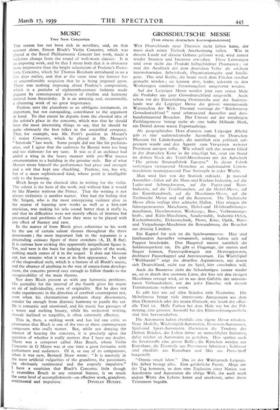MUSIC Two New Concertos
THE season has not been rich in novelties, and, on that account alone, Ernest Bloch's Violin Concerto, which was played at the Royal Philharmonic Concert last week, made a welcome change from the round of well-worn classics. It is an imposing work, and by that I mean both that it is obviously more impressive than the bright eclecticism of Poulenc's Piano- forte Concerto, which Sir Thomas Beecham introduced to us a few days earlier, and that at the same time the listener has an uncomfortable suspicion that he is being imposed upon. There was nothing imposing about Poulenc's composition, which is a pastiche of eighteenth-century fashions made piquant by contemporary devices of rhythm and harmony derived from Stravinsky. It is an amusing and, occasionally, a charming work of no great importance.
Poulenc uses the pianoforte as an obbligato instrument, an Important, but not outsynding, contributor to the argument in hand. To that extent he departs from the classical idea of the soloist's place in the concerto, which was that he should have the most interesting things to say, that he should be quite obviously the best talker in the assembled company. That, for example, was Mr. Petri's position in Mozart's C major Concerto, which he played at Mr. Menges's " Serenade " last week. Some people did not like his perform- ance, and I agree that the cadenzas by Busoni were too long and too elaborate for my taste. It was as if an architect had added a wing in the heavy manner with pre-War rococo ornamentation to a building in the genuine style. But of what Mozart wrote himself the performance had grace and strength and a wit that kept one chuckling. Poulenc, too, has wit, but of a more sophisticated kind, whose point is intelligible only to the knowing.
Bloch keeps to the classical idea in writing for the violin. The soloist is the hero of the work, and without him it would be like Hamlet without the Prince. That the writing is not always violinistic is another matter. One had the feeling that Mr. Szigeti, who is the most enterprising violinist alive in the matter of learning new works as well as a first-rate musician, was making his solo sound better than it really is, and that its difficulties were not merely effects of bravura but presented real problems of how they were to be played with any effect of fluency and ease.
In the matter of form Bloch gives coherence to his work by the use of certain salient themes throughout the three movements ; the most important link in the argument is a descending ostinato figure of three crotchets (A, D, B flat). It is curious how striking this apparently insignificant figure is. Yet, and here is the basis for judging the quality of the work, nothing much comes of it in the sequel. It does not blossom out, but remains what it was at its first appearance. In spite of the rhapsodical style, which is a feature of all Bloch's music, and the absence of anything in the way of sonata-form develop- ment, the concerto proved easy enough to follow thanks to the recognisability of the main themes.
Nor does Bloch present us with any harmonic problems. His partiality for the interval of the fourth gives his music an air of individuality, even of originality. But he does not make experiments in the direction of cerebral counterpoint nor, even when his chromaticism produces sharp dissonances, wander far enough from diatonic harmony to puzzle the ear. He is romantic and emotional, and his music has passages of a warm and melting beauty, while his orchestral writing, though inclined to turgidity, is often extremely effective.
This is, then, a striking work and has led one critic to pronounce that Bloch is one of the two or three contemporary composers who really matter. But, while not denying the interest of hearing the concerto, it is precisely upon the question of whether it really matters that I have my doubts. There was a composer called Max Bruch, whose Violin Concerto in G Minor was at one time a great favourite with performers and audiences. Of it, or one of its companions, when it was new, Bernard Shaw wrote: " It is masterly in the most artificial vulgarities of the grandiose, the passionate, the obviously sentimental and the coarsely impulsive." I have a suspicion that Bloch's Concerto, little though It resembles Bruch in any external feature, is on much the same level of accomplishment—an effective work, grandiose,










































 Previous page
Previous page